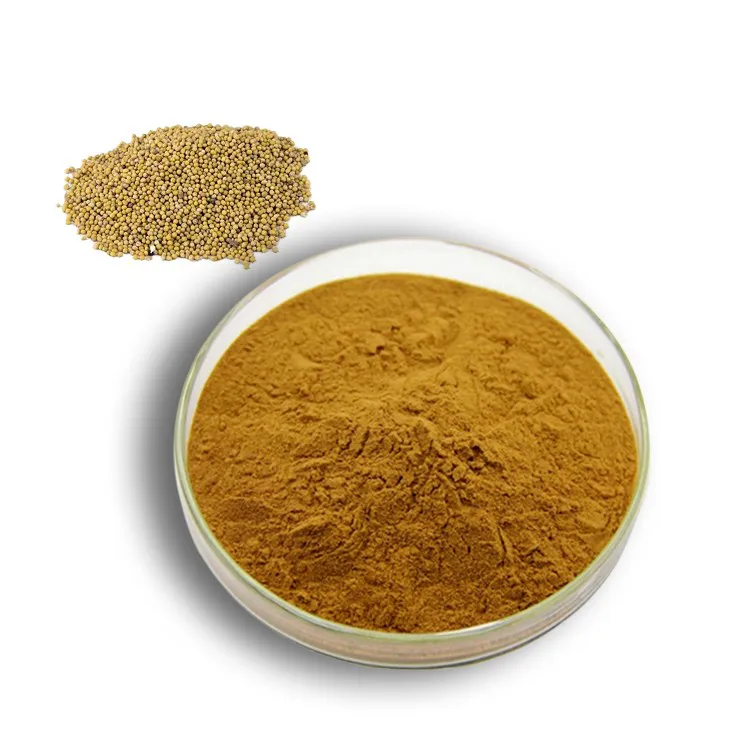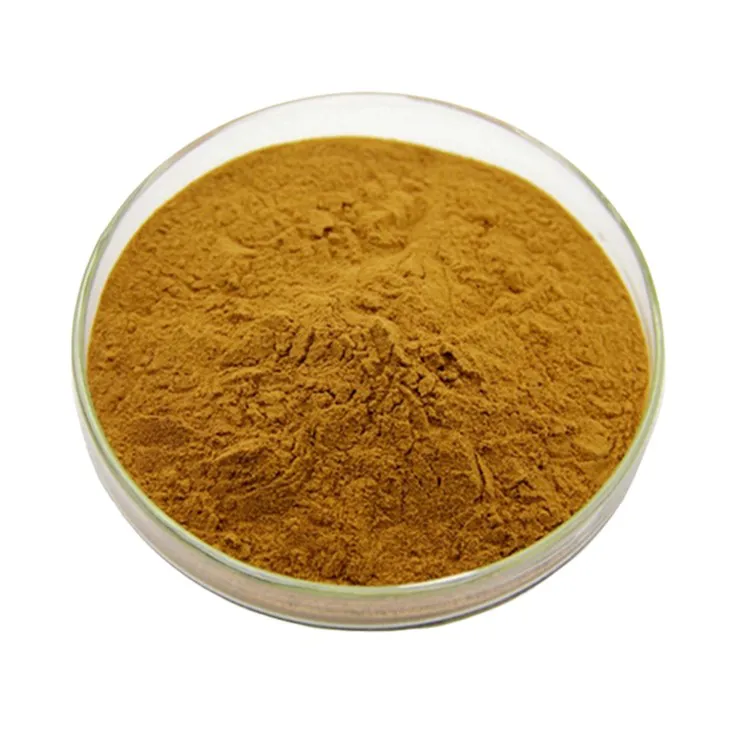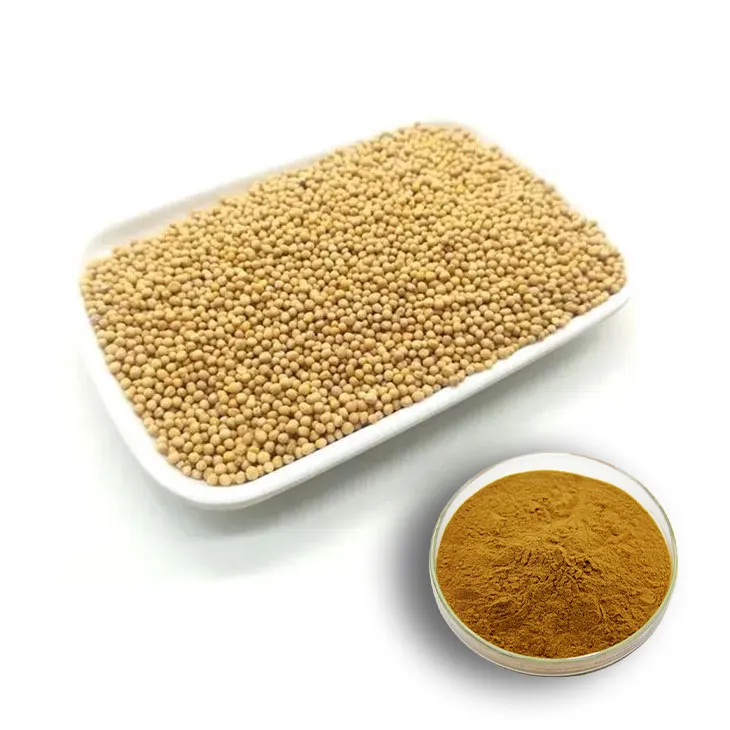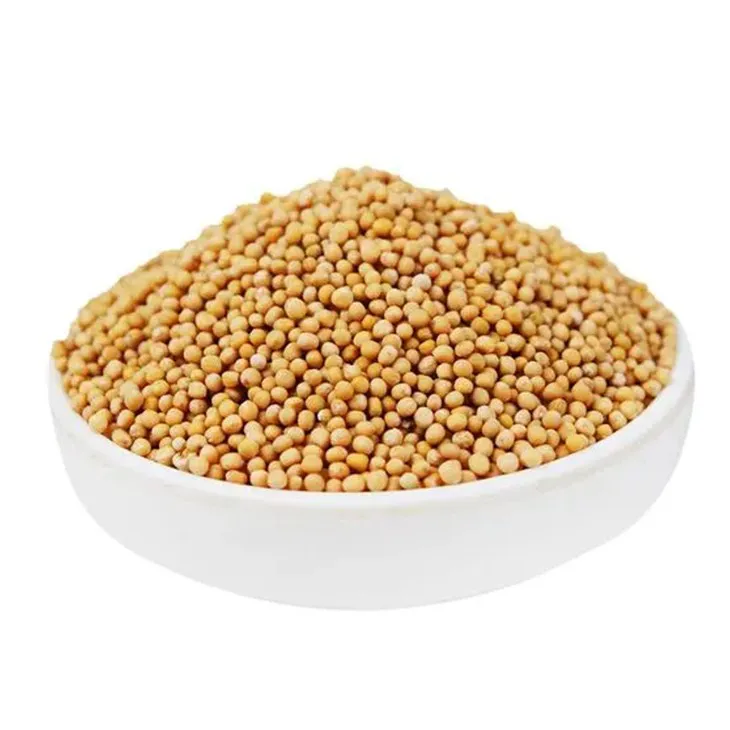- 0086-571-85302990
- sales@greenskybio.com
What is white mustard seed extract? Definition, types, history and nutritional value.
2024-12-21

1. Definition
White mustard extract is a natural product that is sourced from the seeds of Sinapis alba. It is the result of processes such as grinding and extraction. The seeds of white mustard are rich in various bioactive compounds, and these are transferred to the extract during the extraction process.
One of the key components of white mustard extract is glucosinolates. Glucosinolates are sulfur - containing compounds that are characteristic of plants in the Brassicaceae family, to which white mustard belongs. These glucosinolates contribute to the unique properties of white mustard extract. For example, they are responsible for the pungent flavor and aroma associated with white mustard. Moreover, when the seeds are crushed or the extract is processed, glucosinolates can be enzymatically hydrolyzed to produce other bioactive substances such as isothiocyanates, which have been studied for their potential health - promoting effects.

2. Types
2.1 Aqueous Extracts
Aqueous extracts of white mustard are prepared using water as the solvent. These extracts are often favored in some natural remedies. The process of creating an aqueous extract typically involves soaking the white mustard seeds in water, which allows the water - soluble components of the seeds, including certain glucosinolates and other nutrients, to dissolve into the water. The resulting liquid is then separated from the solid seed material, usually by filtration or centrifugation.
Aqueous extracts are considered to be a more "natural" form of the extract, as water is a non - toxic and environmentally friendly solvent. They are often used in traditional or homeopathic remedies. For instance, in some herbal medicine practices, aqueous white mustard extract may be used topically for skin conditions or taken orally for digestive issues. However, the concentration of bioactive compounds in aqueous extracts may be relatively lower compared to other types of extracts.
2.2 Solvent - based Extracts
Solvent - based extracts of white mustard are prepared using organic solvents such as ethanol, methanol, or ethyl acetate. These solvents are chosen based on their ability to dissolve a wider range of compounds from the white mustard seeds, including more hydrophobic (water - fearing) components. The extraction process using a solvent - based method is more complex than that of aqueous extraction.
Solvent - based extracts are often more concentrated in bioactive compounds compared to aqueous extracts. They are used in certain pharmaceutical and cosmetic applications. In the pharmaceutical industry, the concentrated nature of these extracts allows for more precise dosing of the active ingredients. For example, if a particular glucosinolate or its derivative is being studied for its medicinal properties, a solvent - based extract can be used to obtain a sufficient quantity of the compound for further research or formulation into a drug. In cosmetics, white mustard solvent - based extracts may be used for their antioxidant and anti - inflammatory properties, which can help in skin care products to protect the skin from damage and promote a healthy complexion.

3. History
White mustard has a long and rich history of use in traditional medicine across different cultures.
3.1 In Ancient Greek and Roman Medicine
In ancient Greek and Roman medicine, white mustard was highly regarded for its potential therapeutic effects. The Greeks were known to use white mustard in various medicinal preparations. It was often used as a poultice, which is a soft, moist mass of material, typically applied to the skin to relieve pain or inflammation. For example, it might have been used to soothe aching joints or to reduce swelling from minor injuries.
The Romans also made use of white mustard in their medical practices. They recognized its value in treating respiratory problems. It was believed that white mustard could help to expel phlegm from the lungs and relieve coughs. This may be related to the expectorant properties of white mustard, which are likely due to the presence of certain bioactive compounds such as glucosinolates and their breakdown products.
3.2 In Traditional Chinese Medicine
In traditional Chinese medicine (TCM), white mustard has also found its place in some prescriptions. TCM practitioners view white mustard as having warming properties. This means that it is considered to have the ability to increase the body's internal heat or energy. It was often used in prescriptions for conditions where there was a need to dispel cold or dampness from the body.
One of the common uses of white mustard in TCM was as an expectorant. Similar to its use in ancient Greek and Roman medicine, white mustard was thought to help clear the lungs of phlegm. In addition, it was sometimes used in external applications, such as in plasters or compresses, to relieve pain and promote blood circulation in areas of the body where there was pain or stiffness.
3.3 In Other Cultures
White mustard has also been used in other cultures around the world. In some European folk medicine traditions, white mustard seeds were ground and mixed with other herbs to create remedies for various ailments. For example, in some regions, a paste made from white mustard seeds was used to treat rheumatism or muscle pain. In Indian Ayurvedic medicine, white mustard has been used in certain formulations, although its use may be less well - documented compared to its use in Western and Chinese traditional medicine.

4. Nutritional Value
White mustard extract contains a variety of essential nutrients and bioactive compounds that contribute to its nutritional value.
4.1 Proteins
White mustard seeds are a source of proteins. When these seeds are processed into an extract, some of the protein content is retained. Proteins are essential for the body as they are involved in numerous biological processes. They are the building blocks of tissues such as muscles, skin, and hair. In addition, proteins play important roles in enzyme function, immune response, and hormone regulation. The proteins in white mustard extract may also contribute to its potential health - promoting effects, although more research is needed to fully understand their specific functions in this context.
4.2 Vitamins
White mustard extract contains vitamins, including vitamin C and some B - vitamins. Vitamin C is an important antioxidant that helps protect the body against oxidative stress. It is also involved in collagen synthesis, which is essential for healthy skin, bones, and connective tissues. B - vitamins, such as thiamine (B1), riboflavin (B2), and niacin (B3), play crucial roles in energy metabolism. They help the body convert food into energy and are also involved in maintaining the health of the nervous system.
4.3 Minerals
The extract also contains minerals like calcium, magnesium, and potassium. Calcium is well - known for its role in building and maintaining strong bones and teeth. It is also involved in muscle contraction, nerve function, and blood clotting. Magnesium is essential for over 300 biochemical reactions in the body, including those related to energy production, muscle function, and DNA synthesis. Potassium is important for maintaining proper heart function, regulating blood pressure, and balancing the body's fluid levels.
4.4 Glucosinolates and Their Health - Promoting Properties
As mentioned earlier, glucosinolates are a significant component of white mustard extract. These compounds are believed to have antioxidant and anti - inflammatory properties. Antioxidants help to neutralize free radicals in the body, which are unstable molecules that can cause damage to cells and contribute to the development of various diseases, such as cancer, heart disease, and neurodegenerative disorders. By scavenging free radicals, the glucosinolates in white mustard extract may help protect the body's cells from oxidative damage.
The anti - inflammatory properties of glucosinolates are also of great interest. Chronic inflammation is associated with many health problems, including autoimmune diseases, arthritis, and inflammatory bowel disease. The ability of white mustard extract's glucosinolates to reduce inflammation may potentially help in the management of these conditions. However, more research is required to fully understand the mechanisms by which these compounds exert their antioxidant and anti - inflammatory effects and to determine the appropriate dosages for therapeutic use.

FAQ:
What are the main uses of White mustard seed extract?
White mustard seed extract has various uses. In the pharmaceutical field, it may be used for its potential anti - inflammatory and antioxidant properties due to the presence of glucosinolates. In cosmetics, it can be used in products for skin health. In traditional medicine, it has been used as a warming and expectorant agent. It is also used in some natural remedies for its bioactive compounds.
How is White mustard seed extract produced?
White mustard seed extract is produced mainly through grinding the white mustard seeds (Sinapis alba) followed by extraction processes. For aqueous extracts, water is used as the solvent to draw out the active compounds. In the case of solvent - based extracts, organic solvents are used, which can result in a more concentrated form of the extract.
Are there any side effects of using white mustard seed extract?
While white mustard seed extract is generally considered safe, some people may experience allergic reactions, especially those who are allergic to mustard or related plants. Over - use or improper use may also lead to skin irritation in some cases, especially when used in concentrated forms in cosmetics or topical applications.
Can white mustard seed extract be used in cooking?
Yes, white mustard seed extract can be used in cooking. The extract can add a unique flavor to dishes. However, it is important to use it in moderation as it has a strong flavor. It can be used in salad dressings, marinades, and some traditional recipes where mustard flavor is desired.
How does the nutritional value of white mustard seed extract contribute to health?
The proteins in white mustard seed extract can help in building and repairing tissues. Vitamins like vitamin C and B - vitamins play important roles in various metabolic processes. Minerals such as calcium, magnesium, and potassium are essential for bone health, nerve function, and maintaining proper fluid balance. The antioxidant and anti - inflammatory properties of glucosinolates may also help in preventing chronic diseases.
Related literature
- The Bioactive Compounds in White Mustard Seed Extract: A Comprehensive Review"
- "White Mustard Seed Extract: Traditional and Modern Applications"
- "Nutritional and Therapeutic Aspects of White Mustard (Sinapis alba) Seed Extract"
- ▶ Hesperidin
- ▶ citrus bioflavonoids
- ▶ plant extract
- ▶ lycopene
- ▶ Diosmin
- ▶ Grape seed extract
- ▶ Sea buckthorn Juice Powder
- ▶ Beetroot powder
- ▶ Hops Extract
- ▶ Artichoke Extract
- ▶ Reishi mushroom extract
- ▶ Astaxanthin
- ▶ Green Tea Extract
- ▶ Curcumin Extract
- ▶ Horse Chestnut Extract
- ▶ Other Problems
- ▶ Boswellia Serrata Extract
- ▶ Resveratrol Extract
- ▶ Marigold Extract
- ▶ Grape Leaf Extract
- ▶ blog3
- ▶ blog4
- ▶ blog5
-
Cactus Extract
2024-12-21
-
Milk Thistle Extract
2024-12-21
-
Sea buckthorn Juice Powder
2024-12-21
-
Aguaje Extract
2024-12-21
-
Yam Extract
2024-12-21
-
Purple Sweet Potato Extract
2024-12-21
-
Andrographis Paniculata Extract Powder
2024-12-21
-
Pueraria Lobata Extract
2024-12-21
-
Cocoa Extract
2024-12-21
-
Sugarcane Extract
2024-12-21





















